Overview
The article begins by highlighting the coding challenges developers face today, capturing attention with the complexities of maintaining high-quality code. It introduces Kodezi as a solution, showcasing its essential features that effectively address these challenges. By integrating AI tools, Kodezi enhances coding practices, making it easier for developers to navigate their codebases.
Furthermore, the article details the dual approach of static and dynamic analysis, illustrating how machine learning plays a crucial role in identifying issues within the code. This approach not only aids in immediate problem-solving but also fosters a culture of continuous improvement. The necessity of maintaining and evolving the codebase post-analysis is emphasized, ensuring ongoing quality and efficiency in development processes.
In addition, the benefits of using Kodezi are clear: improved productivity and enhanced code quality. Readers are encouraged to reflect on their coding practices and consider how these tools can lead to significant efficiency gains. By exploring the features available on the platform, developers can take actionable steps towards optimizing their coding experience.
Introduction
In the realm of software development, the complexities of coding often lead to frustrating hurdles, including elusive bugs and the quest for optimal code quality. Furthermore, as artificial intelligence continues to revolutionize various industries, its application in code analysis stands out as a game-changer for developers seeking efficiency and precision. This article delves into the transformative process of leveraging AI to analyze codebases effectively, revealing how tools like Kodezi can enhance coding practices and streamline workflows. In addition, with so many options available, how can developers ensure they are choosing the right AI tools to elevate their coding experience?
Kodezi addresses these challenges head-on by offering features designed to improve productivity and code quality. By utilizing advanced algorithms, Kodezi can quickly identify bugs and suggest optimal solutions, allowing developers to focus on what truly matters—writing high-quality code. The benefits of using Kodezi extend beyond mere efficiency; it fosters a more enjoyable coding experience, enabling developers to achieve their goals with greater ease.
As you explore the tools available on the Kodezi platform, consider how they can transform your coding practices. Are you ready to elevate your coding experience and embrace the future of software development?
Understand AI Code Analysis Fundamentals
Coding can be fraught with challenges, from identifying bugs to ensuring quality. AI programming evaluation leverages machine learning algorithms and natural language processing to tackle these issues effectively. Kodezi stands out by utilizing a dual approach that combines static and dynamic analysis. Static analysis examines programs without executing them, allowing for early detection of potential issues. In contrast, dynamic analysis assesses programs during runtime, providing insights into their behavior in real-world scenarios. This comprehensive assessment is crucial for developers seeking to enhance their coding practices.
Furthermore, machine learning models play a vital role in Kodezi's functionality. These models utilize AI to analyze codebase with AI to recognize patterns and anomalies, enabling proactive identification of issues before they escalate. Kodezi enhances this process by automatically analyzing bugs, fixing performance bottlenecks, identifying security issues, and improving formatting. Notably, it provides detailed explanations of the problems encountered. Research indicates that teams employing AI for reviewing programming report quality enhancements, with 81% of users observing improvements in their programming quality. Could you imagine the difference this could make in your workflow?
In addition, natural language processing empowers Kodezi to understand programming comments and documentation, significantly improving its capacity to provide context-sensitive recommendations. By grasping the purpose behind programming, AI systems can offer more pertinent suggestions, ultimately enhancing the overall quality of the codebase.
Understanding these essentials will allow you to appreciate how Kodezi's AI-driven automated builds and testing, combined with the ability to AI analyze codebase with AI, simplify the review process and greatly improve quality. This positions Kodezi as an autocorrect system, setting it apart from autocomplete solutions like others. Are you ready to explore the tools available on the platform and elevate your coding experience?
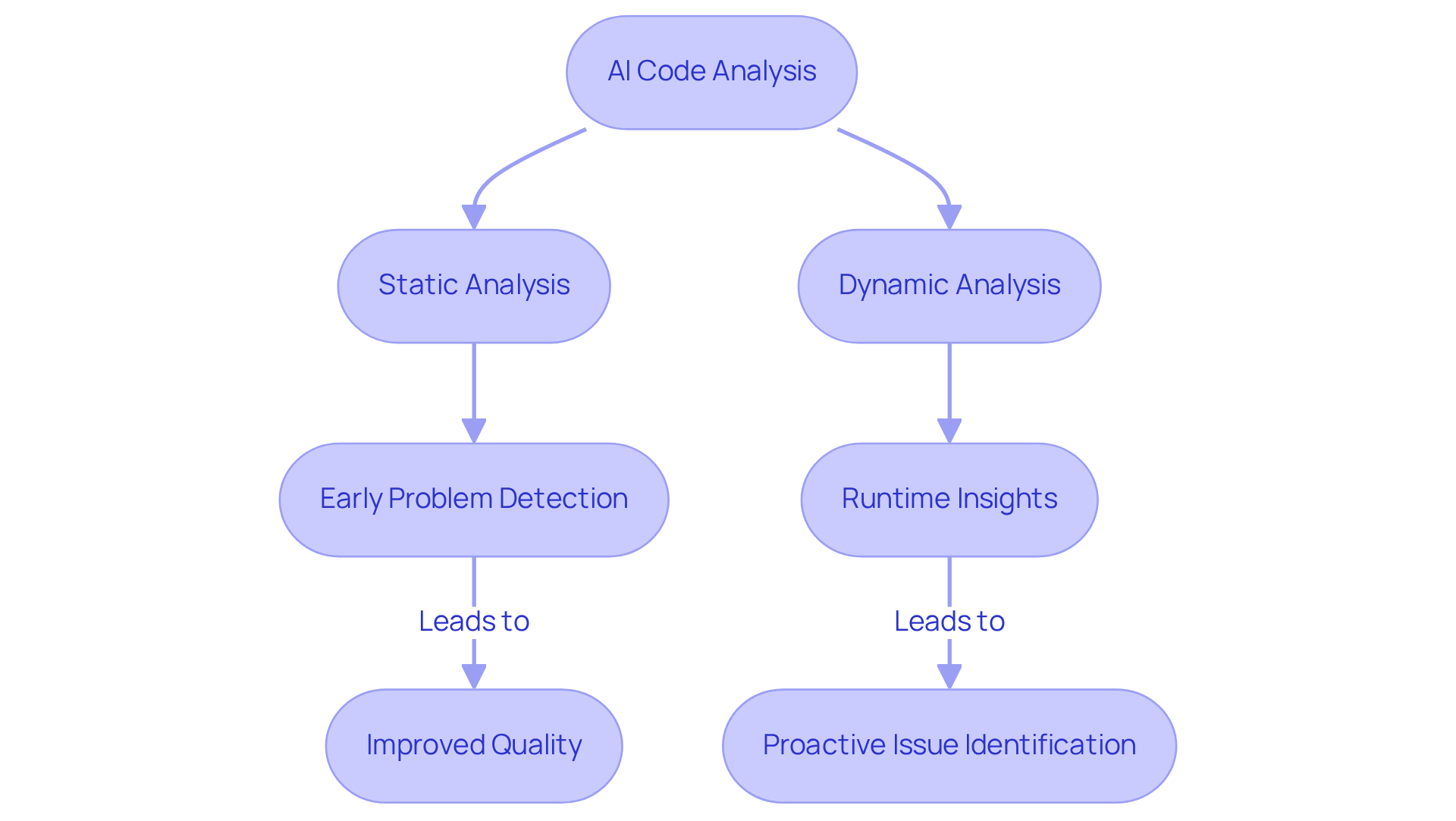
Select the Right AI Tools for Codebase Analysis
When faced with coding challenges, developers often seek effective solutions. Kodezi stands out by addressing these issues through its innovative features.
Compatibility is crucial; ensure the tool integrates seamlessly with your existing development environment, particularly with platforms like GitHub and CI/CD pipelines. Efficient integration allows for swift reviews of scripts and problem identification within established workflows.
Key Features are essential as well. Seek resources that offer fundamental capabilities such as bug detection, test healing, programming refactoring, and automatic documentation updates. The CLI, for example, is a flexible resource for teams, providing self-sufficient bug resolution and pull request creation, which greatly enhances code quality and programming efficiency. Users have reported that Kodezi has helped them locate and resolve bugs more quickly and effortlessly than manual methods, making it an invaluable asset for development teams.
User Satisfaction is another important factor. Research user experiences and feedback to assess the tool's effectiveness. With over 1,000,000 users, Kodezi has transformed debugging for many, with testimonials highlighting its user-friendly features and significant impact on productivity. Metrics such as acceptance rates for suggestions can indicate a positive reception among developers, contributing to improved code quality before reaching quality assurance.
Trial Versions are also beneficial. Utilize free trials to assess the software's capabilities before making a financial commitment. This method enables teams to evaluate how effectively the resource addresses their specific coding requirements. Numerous users have expressed gratitude for the platform's continuous updates and attentiveness to feedback, underscoring the importance of testing the application before fully integrating it into workflows.
Most AI applications emphasize program generation rather than continuous upkeep, which is an important aspect to consider. Efficient AI solutions like Kodezi can conserve substantial time in the development process by allowing developers to ai analyze codebase with ai, automate reviews, and facilitate quicker pull request merges. These metrics emphasize the tangible advantages of incorporating AI resources to ai analyze codebase with ai in the development workflow.
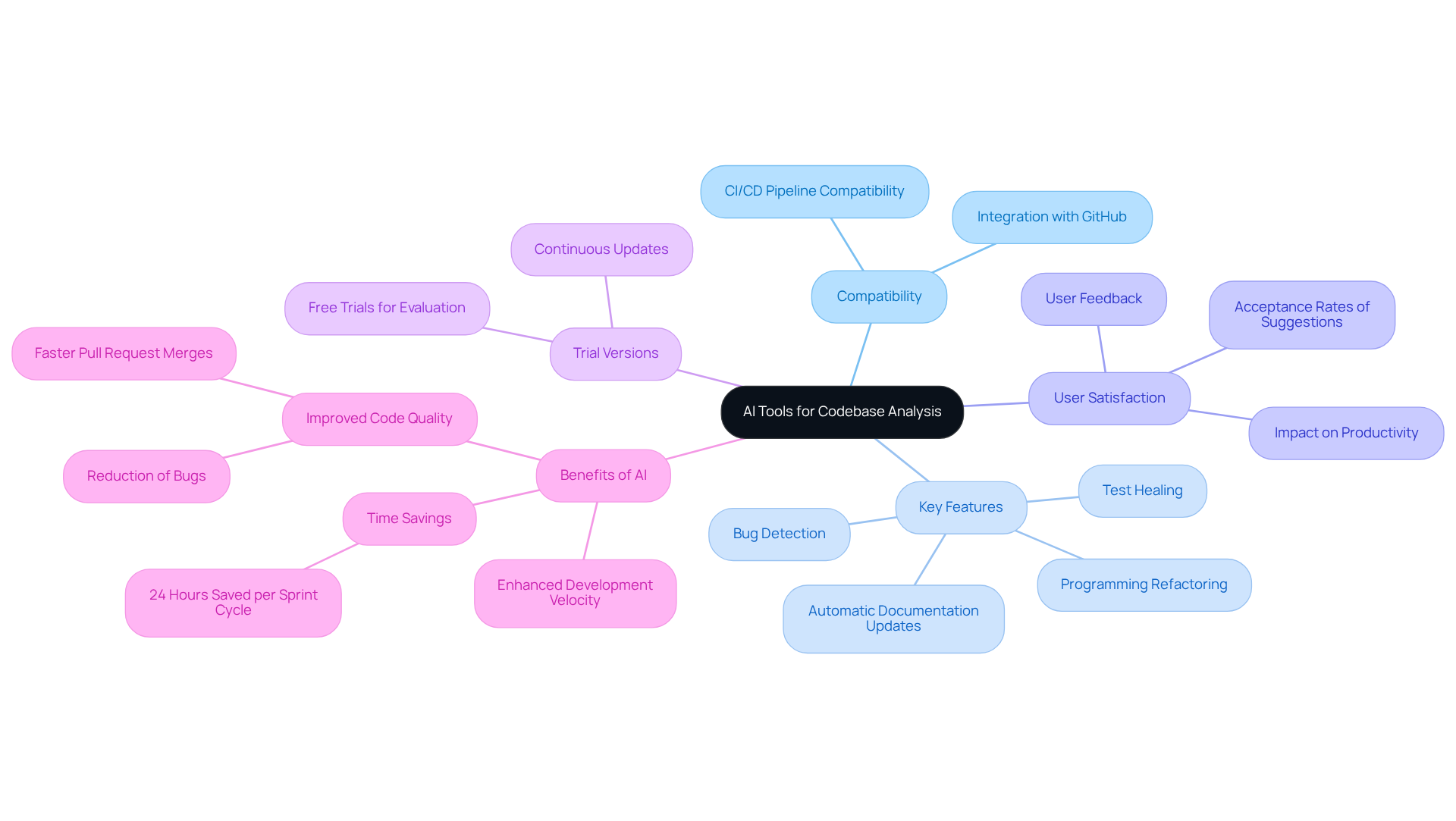
Execute the AI Code Analysis Process
Coding challenges are a common hurdle that developers face, often leading to inefficiencies and technical debt. To tackle these issues effectively, you can leverage the capabilities of Kodezi to ai analyze codebase with ai, providing an autonomous approach to code analysis. Here’s how to execute the AI code analysis process:
- Set Up Your Environment: Ensure your development environment is properly configured. Install and integrate the necessary AI resources, such as Kodezi OS, which can autonomously monitor and improve your codebase.
- Prepare Your Codebase: Clean your codebase by removing unnecessary files and ensuring compliance with coding standards. This preparation is essential for precise evaluation and effective outcomes.
- Run the AI Application: Initiate the AI evaluation system on your codebase. Monitor its progress closely, as these resources can provide real-time insights and may prompt you for additional information or clarification.
- Review the Results: After the analysis is complete, carefully review the findings. Concentrate on recommended enhancements, bug resolutions, and possible vulnerabilities that the AI application identifies, as these can greatly improve your programming quality.
- Implement Changes: Apply the recommended changes to your codebase. Ensure thorough testing after each modification to maintain stability and performance.
By following these steps, you can effectively utilize AI tools like Kodezi to ai analyze codebase with ai, enhance your programming quality, streamline your development process, and reduce technical debt. Why not explore the tools available on the platform today and see the difference for yourself?
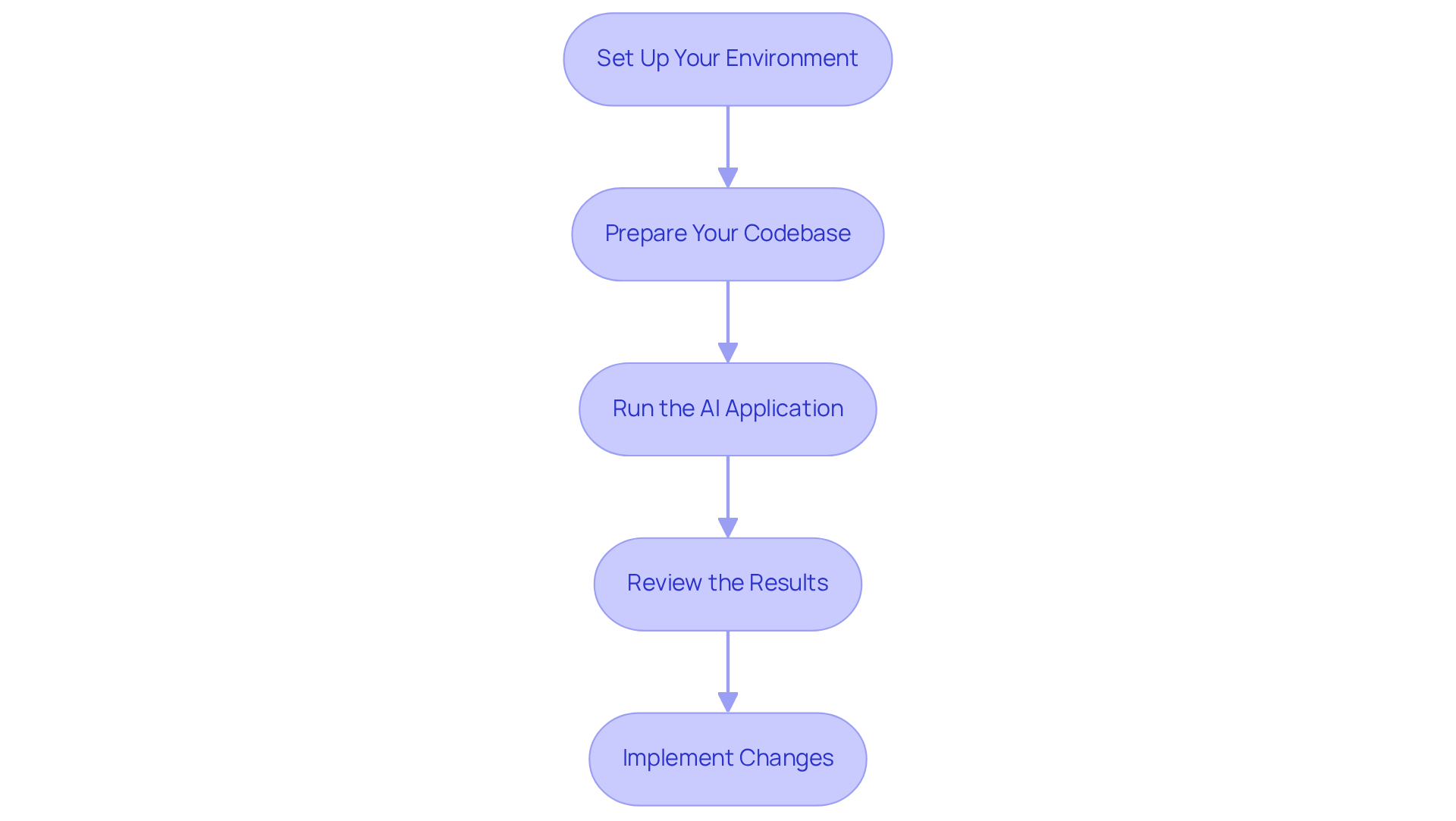
Troubleshoot Common Issues in AI Code Analysis
Coding challenges are a common hurdle for developers. Issues such as incompatibility with the codebase, false positives, performance concerns, and integration challenges can hinder productivity. However, Kodezi provides solutions to these problems, supporting over 30 programming languages and frameworks for seamless integration.
Consider the issue of incompatibility. It is crucial to ensure that Kodezi aligns with the languages and frameworks you utilize. This compatibility guarantees that you can leverage the full functionality of the tool. Furthermore, the software may occasionally flag non-issues as problems, leading to confusion. It is essential to examine these flagged items thoroughly before making any modifications, as automatic bug analysis can clarify these concerns.
Performance is another critical aspect. If Kodezi runs slowly, it is advisable to check your system resources and optimize your environment. A well-optimized setup can significantly enhance the system's efficiency and responsiveness. Similarly, if you encounter integration challenges with your CI/CD pipeline, consulting the documentation for troubleshooting tips and best practices can help resolve compatibility issues and streamline your workflow.
By understanding these common issues and their remedies, you can maintain a more effective evaluation process by using tools that ai analyze codebase with ai development features. This approach ensures that your programming practices are efficient while safeguarding your data confidentiality. Explore the tools available on the Kodezi platform to enhance your coding experience and improve overall productivity.
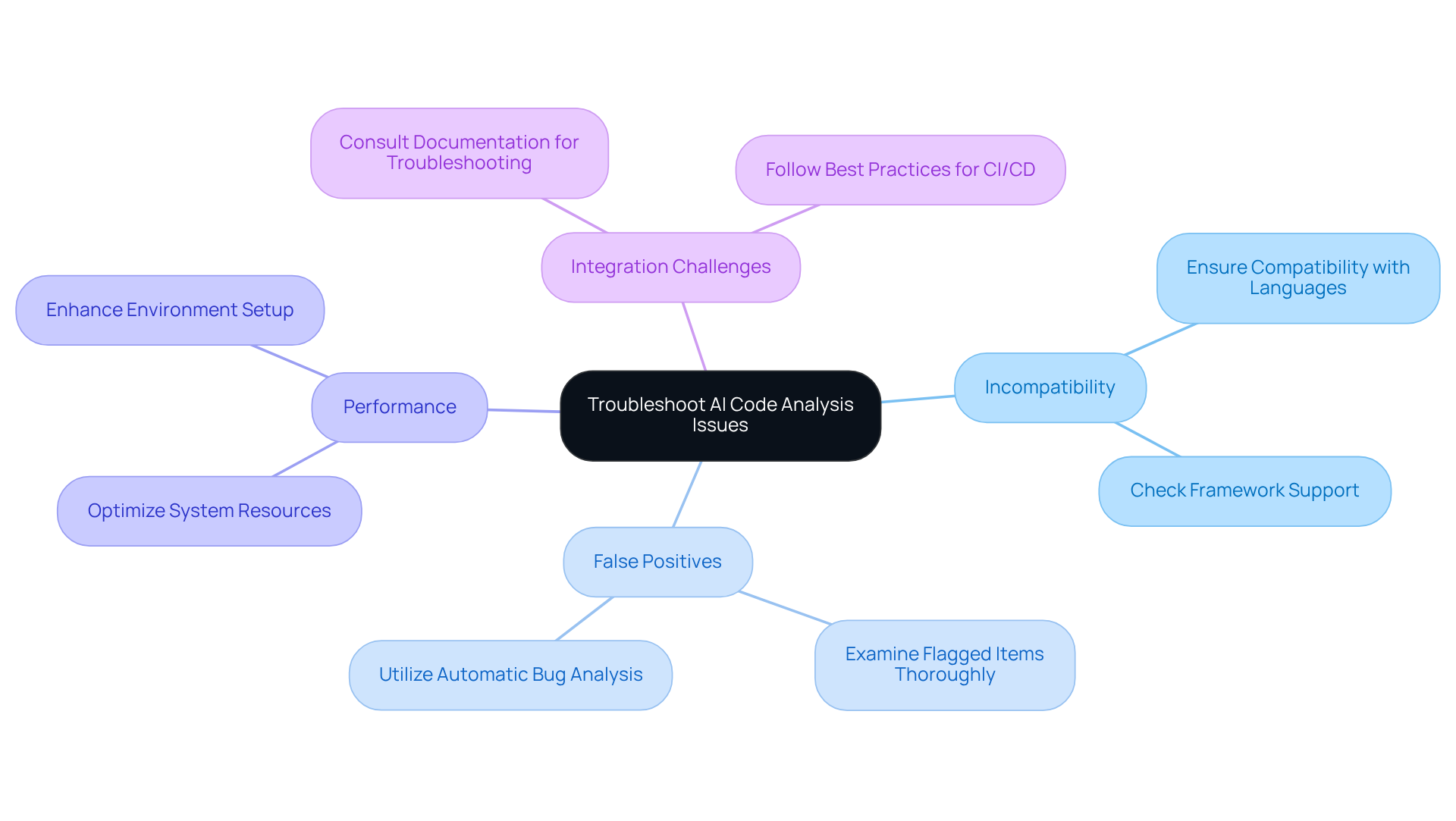
Maintain and Evolve Your Codebase Post-Analysis
In the ever-evolving landscape of software development, maintaining a robust codebase presents its own set of challenges. How can developers effectively address these obstacles? After completing the AI code analysis, consider the following strategies to maintain and evolve your codebase:
- Regular Updates: Schedule regular code reviews and updates to address new issues as they arise. Utilize the CLI to streamline this process, enabling quick fixes and enhancements, conserving time on pull requests.
- Documentation: Keep your documentation up to date with any changes made during the analysis process, ensuring that all team members are aligned.
- Continuous Learning: Stay informed about new AI resources and techniques that can further enhance your codebase and improve coding skills. Utilize free trials and demos to investigate these resources.
- Team Collaboration: Encourage team members to share insights and improvements, fostering a culture of collaboration and continuous improvement. Kodezi CLI serves as a versatile tool for teams, enabling them to auto-heal codebases and enhance productivity.
By implementing these strategies, you can ensure that your codebase remains healthy, scalable, and ready for future challenges, allowing you to ai analyze codebase with ai. Are you ready to explore the tools available on the Kodezi platform to enhance your coding practices?
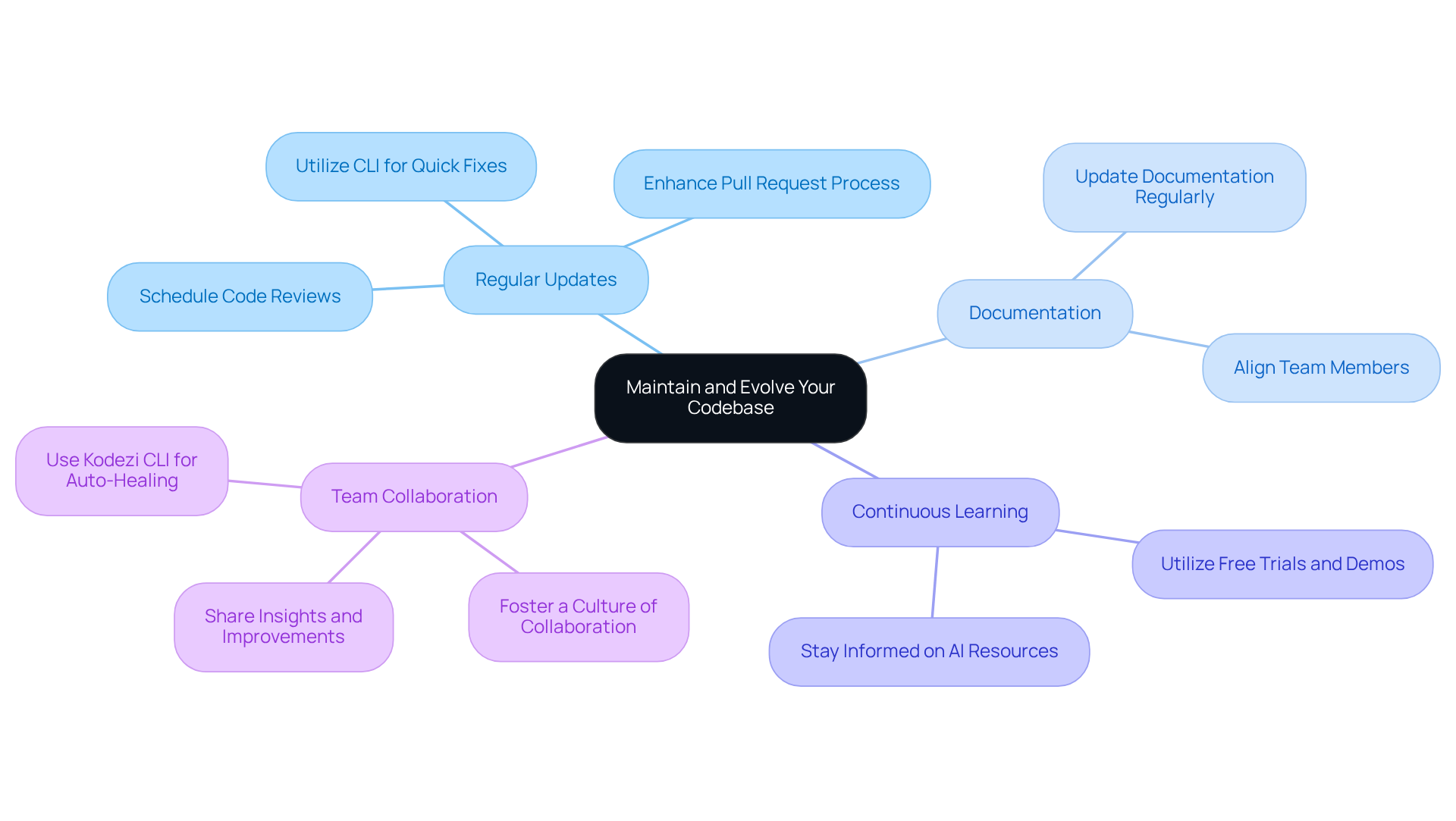
Conclusion
In today's fast-paced development environment, coding challenges are a common hurdle that developers face. However, utilizing AI to analyze a codebase can revolutionize the development process, offering a proactive approach to identifying and resolving issues. Tools like Kodezi, which combine both static and dynamic analysis, directly address these challenges. By leveraging such tools, developers can enhance their coding practices, improve quality, and streamline workflows.
The integration of machine learning and natural language processing within Kodezi allows for a comprehensive understanding of code, leading to significant improvements in programming efficiency. To maximize the benefits of AI code analysis, it is essential to follow critical steps:
- Setting up the environment
- Preparing the codebase
- Executing the analysis
- Reviewing results
- Implementing changes
Each step plays a vital role in ensuring developers can tackle coding challenges efficiently.
Furthermore, troubleshooting common issues and maintaining the codebase post-analysis are crucial for sustaining high-quality standards. Embracing AI in code analysis is not merely about addressing immediate coding challenges; it’s about fostering a culture of continuous improvement and adaptation. By actively engaging with AI tools and methodologies, developers can enhance their current projects while preparing for future challenges in the ever-evolving landscape of software development.
In addition, exploring the available resources and implementing best practices will undoubtedly lead to a more robust and scalable codebase. Are you ready to transform your coding practices with AI? Discover the potential of Kodezi and elevate your development process today.
Frequently Asked Questions
What is AI code analysis, and how does it help in coding?
AI code analysis leverages machine learning algorithms and natural language processing to identify bugs and ensure quality in coding. It helps developers enhance their coding practices by providing insights into potential issues early on.
What are the two types of analysis used by Kodezi?
Kodezi uses static analysis, which examines programs without executing them to detect potential issues early, and dynamic analysis, which assesses programs during runtime to provide insights into their behavior in real-world scenarios.
How do machine learning models contribute to Kodezi's functionality?
Machine learning models in Kodezi analyze the codebase to recognize patterns and anomalies, enabling proactive identification of issues such as bugs, performance bottlenecks, security issues, and formatting problems before they escalate.
What benefits do teams experience when using AI for programming reviews?
Research indicates that 81% of users report quality enhancements in their programming when employing AI for code reviews, leading to improved coding practices and efficiency.
How does natural language processing enhance Kodezi's capabilities?
Natural language processing allows Kodezi to understand programming comments and documentation, which helps it provide context-sensitive recommendations and more relevant suggestions that enhance the overall quality of the codebase.
What should developers consider when selecting AI tools for codebase analysis?
Developers should ensure compatibility with their existing development environment, look for key features such as bug detection and automatic documentation updates, and assess user satisfaction based on feedback and metrics.
What are some key features to look for in AI code analysis tools?
Key features include bug detection, test healing, programming refactoring, automatic documentation updates, and tools that facilitate self-sufficient bug resolution and pull request creation.
Why are trial versions of AI tools important?
Trial versions allow teams to evaluate the software's capabilities and effectiveness in addressing their specific coding requirements before making a financial commitment.
How does Kodezi differ from other AI applications in the market?
Kodezi focuses on continuous upkeep and efficient AI solutions that conserve time in the development process, allowing for automated reviews and quicker pull request merges, unlike many AI applications that emphasize program generation.




